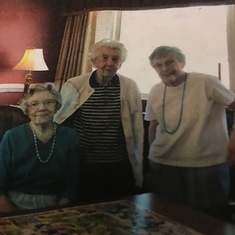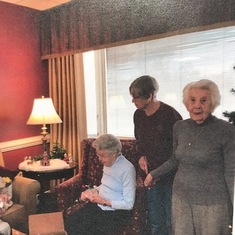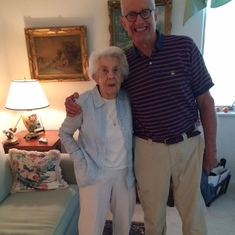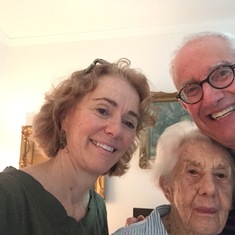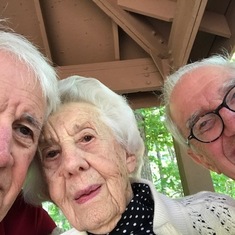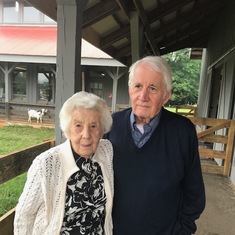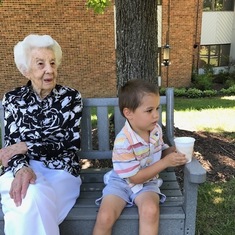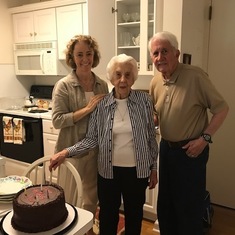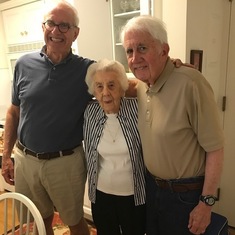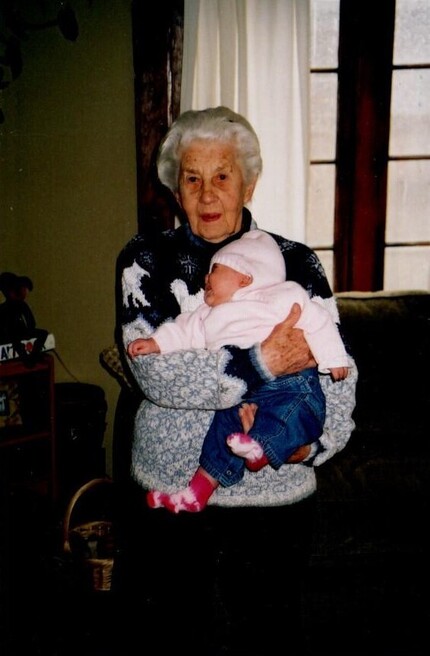Grace was born on July 13, 1922 in Nicholas County, West Virginia. Her
father was Walter Ray Piercy and her mother was Nannie Craig Piercy. She
was the youngest of nine children. Her father was a farmer and fur
trapper and her mother ran the house and oversaw the garden and the
poultry. Her father was gone occasionally on train trips to Chicago to
transport cattle. He often rode on horseback into the wilderness to trap
furs and hunt. Grace learned to be responsible at an early age. Raising
chickens, ducks and geese was one of her main chores. Seeing the new
chicks hatch was her favorite part. She also helped during lambing and
calving seasons. She rejoiced in all forms of new life. Whether it was
livestock, plants and flowers or children, living things seemed to
flourish under her care.
During the Great Depression times were
hard on the farm in Nicholas County. Her mother showed Grace how to put
together an edible salad with wild greens, such as dandelions, found on
the farm. It was during this time that she lost her favorite brother,
Ellis, to Rheumatic Fever. She talked about that loss late into her
life. In the early 1930's, still getting by on subsistence farming, her
Dad helped his brother try to keep his farm by cosigning a bank note.
When his brother could no longer make the payments both farms were lost.
It was then that the family moved to Virginia. Eventually, they were
able to pull together enough money to buy a 430 acre farm on the James
River known as Mt. Ida. They paid $5,000 for the farm. The house was
old, historic in fact dating to 1786, but was austere by current
standards: wood stove heat, 14 rooms, minimal electric, wood burning
cook stove, one sometimes bathroom, but one reliable outhouse that never
developed plumbing problems. Drinking water came from a spring on the
low grounds, a ten minute walk down a steep hill. It was here that the
family built a successful farm with sheep, milking and beef cattle,
chickens, ducks, and pigs. The farm had an apple orchard, plum trees and
an abundance of blackberries.
Grace attended Buckingham County
Schools. She rode a horse two miles on a dirt road to get to the bus
stop. The horse would return home once she boarded the bus. Two of her
high school friends gave her a rifle to take with her to the bus stop as
they were concerned for her safety. She would hide it in the woods near
the bus stop. Grace wasn’t scared but she didn’t want to hurt their
feelings. Grace was a good student and a very good athlete. She was
captain of her softball and basketball team in Buckingham Central High.
She grew up loving to read and Mt. Ida had an upright piano and a
Victrola so music was always a part of her life. Her favorite class was
Home Economics. Her dream was to have a large family and to care for
them as she had been cared for growing up. She grew up in the Baptist
Church and attended Mt. Zion Baptist Church in New Canton.
After
graduating from high school she moved to Richmond and eventually got a
job in a Navy office in Norfolk at the beginning of World War II. It was
during this period that she met the love of her life, William Lipscomb,
a young ensign in the Navy and a recent graduate of Richmond
Professional Institute, an affiliate of William & Mary College. Bill
was an artist, a painter of increasing promise. On June 17, 1942 they
were married at Mount Ida.
She and Bill lived in Jacksonville,
Marathon Key, and Pleasantville, N.J. for a short time. In August of
1943 she gave birth to Chip. While Bill was in England with the Navy she
and Chip lived in Richmond on Barton Avenue. She and Chip were never
alone. In addition to Grace’s extensive family of origin, Bill’s family
lived in Richmond only a few blocks away. Doris, Bill’s older sister,
stopped by every morning to visit with Grace and Chip. Alice as well as
Bill’s parents did their best to spoil Chip. Will, Bill’s dad, who drove
a milk delivery truck for Richmond Dairy, made sure they always had
milk and other dairy products.
After the war ended, Bill returned
to Virginia and their second child, John, was born in 1946. Bill was
now a Lieutenant in the Navy and was reassigned to Washington, DC. They
lived in the Shirley Duke Apartments in Alexandria and Chip and John
went to Alexandria City Schools. When Bill began to experience extreme
nervousness and loss of muscle control, it soon became apparent that he
would have to take a leave of absence from the Navy and enter the VA
Hospital at McGuire’s in Richmond. The doctors concluded that Bill had
MS. At that time there were no effective treatments for this disorder.
So, the family moved to Richmond in 1952 and lived with Bill’s parents
for a year on North Avenue. At the time of the move, Grace was pregnant
and Tim was born in March of 1953. Chip and John, then 9 and 6, could
walk everywhere they needed to: JEB Stuart Elementary School, the Rexall
Drug Store (great cherry coke), The Brooklyn Theater (10 cent movies
and 6 cent candy) and the Barton Heights Methodist Church, where John
and Chip were in the children’s choir. Grace realized that she would
have to work to help support the family. She went to Business College
and after training for basic office work she got a job in the offices of
the A&P Food Stores on Broad Street. Her children loved to visit
her there as the office was located between the Sauers Vanilla factory
and the FFV Cookie factory. The smells were worth the trip. However, our
young family sandwiched into a small house with grandparents became
difficult. So, with a $500 loan from her Dad, Grace and Bill found a
small tract house in the West End. Although Grace didn’t qualify for the
$4,500 loan, the developer sensing the need, her integrity, and her
desire for a better life for her family, made the deal work. There were
no schools nearby yet, but Grace had a strong faith and although the
house was then on the outer fringe of Richmond, soon there was a high
school (Douglas Freeman), and Middle School (Tuckahoe) built within
walking distance. Her children could walk to sports fields, church
(Ridge Baptist) and the subdivision was soon full of kids and young
families. She and her children were always surrounded by family and
friends. Her small two bedroom house was the center of many gatherings
for over 50 years. If her family couldn’t come there, she made sure the
kids went to them: Mount Ida, Aunt Edo’s house in Fairfax, the lake, and
Aunt Rea’s farm were often visited during school breaks and summer
vacations.
With Grace working and the children in school or daycare
she quickly fell into a routine, one that offered security and comfort
to her family. She managed her home, her office job, her children, a
critically ill husband, all with the smooth precision of the athlete she
was. Her home was clean, tastefully decorated and always welcoming.
Things got broken, dented and spilled in that house, and she never got
upset. People always won out over things. Her mornings started about
5am. Children awoke to the smell of fresh perked coffee and bacon
cooking. She always sent the kids to school in clean pressed clothes
after a hot breakfast. There was no clothes dryer so Grace would have to
hang wet clothes on the line before work every day. In the winter they
would freeze before she finished hanging them. Although the children
often wore hand-me-downs their clothes were clean and all holes were
mended. After dishes were washed, dried and put away she would get
dressed and leave for work at 7:45am, dropping Tim off at daycare on the
way. Grace got home from work about 4:30pm. She would prepare a well
balanced dinner (all the essential food groups) as well as a homemade
dessert. In her small kitchen she would spend hours daily preparing hot
nutritious food for her children and cookies, cakes, fudge and pies to
share with family, neighbors, church and friends. She didn’t throw food
away. Leftovers would magically appear the next night as an
unrecognizable but delicious surprise. The boy’s helped wash and dry
dishes, and took the trash out. After dinner, while the children did
their homework, Grace would do laundry, iron clothes, and
prepare
lunches for school the next day. The ironing board and iron generally
stayed set up in the den. It made a nice fort for smaller kids with a
sheet hanging over each side. She was often up until midnight preparing
for the next day. What to many probably looked like drudgery, she loved.
She was thankful for her life and it showed in her face and how she
lived. Blessings were always spoken at all meals and prayers were always
offered at bedtime. She never quoted scripture; but she lived the Bible
by example. She made sure the family attended church and Sunday School
every Sunday except for occasional large family fun days at Trice’s Lake
with all the aunts, uncles and cousins. She and her five sisters would
make fried chicken, potato salad, brownies, deviled eggs and various
other delights. All the children had to do was have fun.
Despite
her busy life she still found time to be a Scout Den Mother, attend
games and school activities involving her children, and baked to support
fund drives. She wasn’t afraid to look foolish if it encouraged and
supported her kids. She chaperoned dances, always by herself, and she
played catch with children learning to play ball. She even won the
roller pin throwing championship at a parent / child school field day.
She loved a snow day and would sled, help make a snowman and still find
time to make hot chocolate.
She never forgot about Bill at the
V.A. and made sure the children didn’t either. On Sunday, after church
the family would travel across Richmond to the McGuire’s Hospital or to
his parent’s house to visit with Bill. The visits generally lasted a
couple of hours and included stories for Bill about what each child had
done that week. He listened carefully to each account and through the
years he would send books to the kids to encourage and educate them in
their interests. Since school and Grace’s work precluded regular
mid-week visits, Grace and Bill came up with a plan so that he could
visit with them anytime he got lonely. Since there were no cell phones
his only way to communicate was by pay phone. The payphone cost 10
cents, which became expensive on their meager budget, so Bill would call
the phone on Maywood and the children were instructed to let it ring
twice. If it then stopped ringing, it was Dad, and they called him back
for free. Calls were a daily occurrence. Fifty-three years after his
Dad’s death John still remembers the phone number.
She knew that
everything she had was just on loan from God. She tithed to church
throughout her life even when she worried about how to find money for
the house payment, and the money always came. She never missed a payment
in 30 years. Even though she had little in terms of money to give
her
children, she made sure they got the important things. Good manners
weren’t an option in their home. Manners, she taught, were to prepare
her boys for lives beyond her house, so they would comfortably fit in
regardless of where or with whom they dined. Silver was polished and
used at every special meal and on Sunday. Every gift, she taught, was to
be acknowledged with a handwritten note. Through weekly or sometimes
biweekly trips to visit her husband, she taught her children about
loyalty and compassion. When people suffered loss she got close and
brought food or did whatever it took to help. Anytime she prepared a big
meal she sent plates to neighbors. Other children in the neighborhood
were constantly being treated to cookies or other goodies.
Although
family vacations were rare her children were taught at an early age to
read and to explore through books. Homework had to be done before they
could play. All her boys’ had chores, most were done as part of family
responsibility and occasionally they would get an allowance for special
jobs. Non-essentials had to be earned not freely given. Gifts were for
Christmas and birthdays. Money management was a course taught
continually in her home. Every Friday night when she got her paycheck
the entire family would go grocery shopping at the A&P. She had to
be a careful shopper and knew how to economize and avoid processed
foods. She kept cars until they literally fell apart. Once she took us
with her to buy a new car. When she had made a decision to buy the most
basic of sedans, it was obvious even to small children that the price
she could afford to pay didn’t come up to the dealers lowest price. In
the sales managers office three men in suits proceeded to pressure her
into the sale. “Look little lady, you can go anywhere in Town and you
will never get a deal this good”. In a kind but firm voice Grace said “I
already have” and with her three sons in tow walked out. Mom was always
kind and polite but was not a pushover. She seemed to know what was
right in every situation and she always did it.
The home at 1310
Maywood Road was a sanctuary. It was a safe place for all that entered
it. It was a refuge for any and all children, dying brothers, sisters,
Grace’s mother, and for children occasionally rescued from a troubled
home. She understood death and dying and accepted it with sad
resignation. But, she wept openly for children who were ignored or
mistreated, and she always intervened to save them. Everything within
those walls made sense. Punishments seemed fair and loving even to the
offender. There were never any unkind outbursts or criticisms. Nieces
and nephews spent weeks in this home, the boys friends were always
there. After the death of her father and the sale of Mount Ida in 1959,
her mother, Nancy, began spending every winter there. As the boys got
older and began to date, promising companions would be invited over to
meet Mom. She generated such kindness and love that a trip to our home
generally “sealed the relationships”. Girls that could barely tolerate
her boys loved their mom.
The boys, one by one, all graduated
from high school and with her help all received undergraduate and
graduate degrees and all served their country as officers in the Navy.
After
the boys had left and started their own families she began to travel
some. She traveled to Hawaii and England to visit Tim, took numerous
beach trips with John’s family and took excursions with Frances and
Brenda, Dad’s sister Doris and dear friend, Francis Fooge. She also
gardened extensively in her yard. A yard that for years was more bare
spots than green was transformed from ball field to flower garden.
Azaleas, iris, peonies, pansies and anything she planted flourished.
But, the priority in her life was still service. John and Tim were
constantly coming to Maywood for weekend trips and longer visits when
work permitted. Chip’s family had a standing invitation for Tuesday
night dinner. The priority in her life remained service. As her older
brothers and sisters and her mother became infirm she brought some to
Maywood while she cared for them and the others she regularly visited.
At
the age of 86, Grace decided to sell her house of over 50 years and
move to an apartment at Lakewood Manor. Numerous invitations from family
members to move in with them she rejected, not wanting to be a burden.
She adjusted well to Lakewood and made numerous friends. Even with
limited window light she found room to grow plants and flowers, even
using the “trash room” on the third floor (great light) to express this
love.
As she gradually began to decline she graciously made
adjustments to her life. When she could no longer drive she gave away
her car and rode the Lakewood bus. When she could no longer travel she
visited ill friends at Lakewood as they moved into healthcare. She was a
constant source of strength and wisdom for her whole family. Even in
the last year when she was condemned to solitary confinement due to the
Coronavirus she still taught life lessons. She never complained although
she certainly was in pain. She always focused on her “loving, rich and
blessed” life. When asked by family members how to do something that
seemed insurmountable she would always say “you just have to do it”.
Grace
would have been embarrassed by the above summary of her life. She hated
a “fuss”. But she raised her children to be independent thinkers, so
there you have it. Anyone who didn’t know her will probably find this
overly sentimental and exaggerated but for those who knew her, I think
they will understand.
Grace will be greatly missed, but she lives on in all those whose lives she touched.



